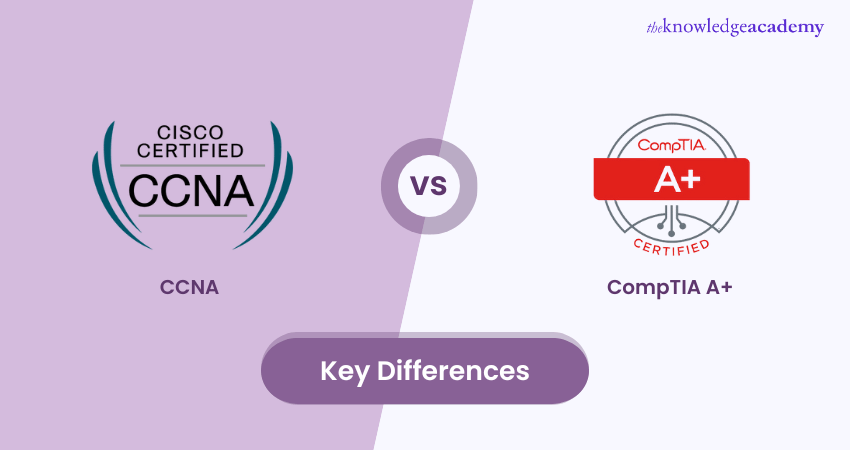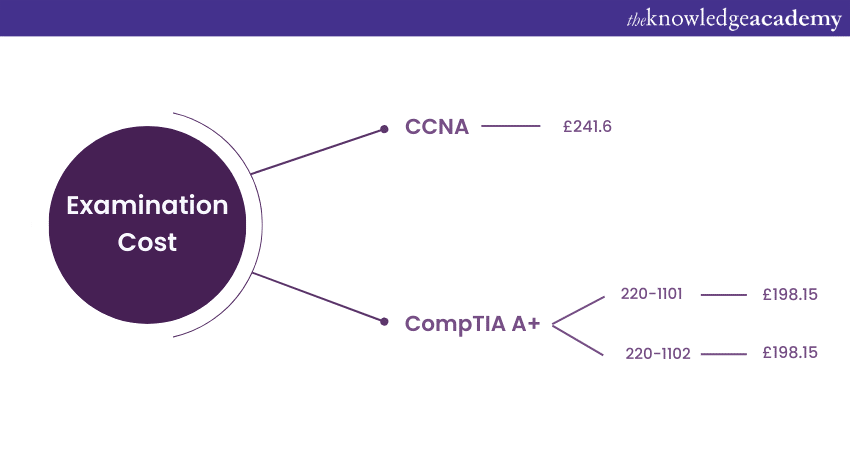We may not have the course you’re looking for. If you enquire or give us a call on +44 1344 203 999 and speak to our training experts, we may still be able to help with your training requirements.
We ensure quality, budget-alignment, and timely delivery by our expert instructors.

The significance of earning an Information Technology (IT) certification is high among students today. Hence, deciding on the perfect type of certification is becoming increasingly challenging. CompTIA A+ and CCNA are two valued certifications in the field of IT, but the CCNA vs CompTIA A+ debate has been going on for a while.
CompTIA A+ is a vendor-neutral networking certification, and CCNA is a Cisco-specific one. According to CompTIA, over 96% of IT Managers prefer employees with IT certifications over others.
Cisco and CompTIA certifications are among the best IT certifications for 2023, which increases the value of CCNA and CompTIA A+ certifications, respectively. Check out the differences between the CCNA and CompTIA A+ certifications. Read ahead to know the best certification choice for your career in 2023.
Table of Contents
1) Introduction to CompTIA A+
2) Introduction to CCNA
3) CCNA vs CompTIA A+: Differences
4) Which certification is best for you in 2023?
5) Conclusion
Introduction to CompTIA A+
CompTIA A+ Certification is a globally recognised certification based on an advanced understanding of computers and hardware, with a basic knowledge of servers and networking. It prepares you for enriching careers by providing the skills to design and manage wired and wireless devices.
It was introduced by the Computing Technology Industry Association (CompTIA), which provides vendor-neutral IT certifications. The certifications provided by CompTIA aim at contributing to the development of security, cloud, networking, and more.
Another valuable CompTIA certification is CompTIA Network+. It provides the necessary skills to work with multiple networks and improves your understanding of new technologies like Virtualisation.
CompTIA A+ is a significant certification that can offer entry-level IT jobs and enhance your skillset for career advancement. Some of the jobs that can be pursued with a CompTIA A+ certification are:
a) Service Desk Analyst
b) Technical Support Specialist
c) System Support Specialist
d) Network Engineer Associate
e) Cyber Security Manager
f) Data Maintenance Technician
Introduction to CCNA
CCNA is an acronym for the Cisco Certified Network Associate. CISCO provides the CCNA certification and offers skills to evaluate and repair different networks, configure routers and switches, etc.
Earning a CCNA certification starts with clearing the CCNA examination. No prerequisites are required for the exam, but candidates are preferred to have at least one year of experience with CISCO products and fundamental knowledge about Internet Protocol (IP) addressing and networks.
CCNA can be your first step into a career in networking because certifications from CISCO have a high demand in the IT industry. It can provide opportunities for employment at entry-level and higher-level positions in the networking sector. Here are some of the jobs that can be attained using a CCNA Certification:
a) Technical Support Engineer
b) System Engineer
c) Network Administrator
d) IT Manager
e) Network Security Specialist
CCNA vs CompTIA A+: Differences
Earning certifications is a great way to attain high-paying jobs or advance in your career in the IT field. CCNA and CompTIA A+ are two certifications of great significance. Learning about the differences between the two is important to make an informed choice. Here are some of the major factors that differ between CCNA and CompTIA A+:
Exam Topics
You can earn the CCNA and CompTIA A+ certifications by clearing their respective examinations. Although both the courses are related to IT, their knowledge will be tested on different topics. Let's look at some of the topics of information that you need to cover before taking the exams.
|
Topics for the CompTIA A+ exam |
Topics for the CCNA exam |
|
Basic security skills |
Fundamentals of networking concepts |
|
Knowledge to set-up Operating Systems (OSs) |
IP services |
|
Basic concepts of networking |
IP connectivity |
|
Configuration of hardware of PC, mobile, and IoT devices |
Automation |
|
Fundamental knowledge of IT infrastructure |
Programmability |
Two sets of exams must be cleared to earn a CompTIA A+ certification - 220-1101 and 220-1102. While the 220-1101 exam deals with hardware-related topics, 220-1102 deals with security, software troubleshooting, and more.
The topics that have a high chance of appearing for the exam are related to basic knowledge of security, networking, and IT infrastructure. It also includes the knowledge of setting up OSs, especially Linux, Windows, Mac, Android, Chrome OS, and iOS.
The CCNA examination tests your knowledge and experience regarding networking concepts, CISCO products, and tools. Thus, the topics to familiarise yourself with to clear the exam include networking concepts, knowledge about IP services and connectivity, and automation and programmability.
Examination Cost

The examination cost of CCNA and CompTIA A+ are essential factors to consider. CompTIA A+'s examination cost is considerably cheaper than that of CCNA. Let's look at the cost breakdown of both certifications:
a) CCNA: It has multiple categories like Security CCNA, Wireless CCNA, etc. The CCNA Routing and Switching is the most popular, which costs £241.6. The test lasts for 120 minutes and consists of 100 – 200 questions.
b) CompTIA A+: The CompTIA A+ examination consists of two exams – 220-1101 and 220-1102. Each exam costs £198.15, and both test different aspects of your knowledge.
Average Annual Salary
As the nature of jobs with a CCNA and CompTIA A+ certification differ, their salaries also vary. Let’s look at the difference in the average annual salaries of CCNA and CompTIA A+:
|
|
CCNA-Certified Professional |
CompTIA A+-Certified Professional |
|
Average Yearly Income |
£67,986.81 |
£36,259.20 - £48,345.60 |
CCNA-certified professionals receive an average annual salary of £67,986.81 from their jobs. On the other hand, CompTIA A+-certified professionals earn an average yearly income of anything between £36,259.20 - £48,345.60. Although, jobs like Desktop Support Analyst can help bring in an average income of £48,345.60.
Wish to learn more about CompTIA A+? Earn your certification by signing up for our CompTIA A+ Training course now!
Career Path
Although CCNA and CompTIA A+ certifications provide multiple job opportunities, they can lead you on separate career paths. While CompTIA A+ certifications lead you to jobs based on maintaining organisations' hardware, CCNA certifications provide jobs based on networking. Let's look at some of the jobs that can be pursued using either certification with their roles specified:
|
CompTIA A+ |
CCNA |
|
Desktop Support Administrator |
Network Security Specialist
|
|
Data Maintenance Technician |
Network Administrator
|
|
Cyber Security Manager
|
Technical Support Engineer
|
The CompTIA A+ certification is centred around computer repair and is perfect for IT support jobs like Data Maintenance technicians, Cyber Security Managers, and Desktop Support Administrators. Here are the responsibilities of a Desktop Support Administrator:
a) Desktop Support Administrator: A Desktop Support Administrator helps improve organisations' technological situation. They are responsible for installing and repairing Personal Computers (PCs), printers, mobile devices, and other machines, which allows employees to work efficiently, i.e., not getting interrupted by technological issues.
They handle all tasks related to the desktop environment, from setting up computer systems for the new employees to fixing software. Even the proper functioning of network printers is dependent on Desktop Support Administrators.
The CCNA certification is based on concepts of networking, security, automation, etc. One of the Benefits of CCNA Certification is that it paves the way for higher-paying jobs compared to CompTIA A+. One of the quality jobs that can be obtained with a CCNA certification is:
b) Network Security Specialist: As the term suggests, such a professional is responsible for maintaining the security of an organisation's networks. They analyse the data collected by Security Specialists on weak security areas and provide appropriate measures to tackle the issues.
Their responsibilities include analysing fraudulent network practices and documenting the possible threats to the organisation's system and networks. Every detail must be recorded, from the attacker's procedure to manipulate the organisation's network to the final solution.
Get familiar with cyber operations and learn to monitor networks securely by signing up for our CCNA Cybersecurity Operation Training course now!
Which certification is best for you in 2023?
There are numerous IT certifications that, when earned, can considerably improve your career path and skillset. Although there is a vast range of courses, the CCNA and CompTIA A+ certifications are still significant. You can select either certification based on your career goals, skillset, experience, time, and budget.
For instance, the preparation time for CCNA examinations is considerably more than that of CompTIA A+, as candidates must deeply understand its topics. So, if you have limited spare time, then a CompTIA A+ certification is the best choice.
Your choice of certification also depends on the type of job required. Let's look at the best course choice if you are looking for an entry-level position or if you have ample experience in the IT field and wish to progress in your career:
a) Entry-level jobs: If you have minimal IT experience, then a CompTIA A+ certification is the best choice. This is because it deals with topics that can provide a basic understanding of computer hardware and Oprating System (OSs), which are fundamental topics in IT.
You can gain access to multiple entry-level jobs with a CompTIA A+ certification. Since it's a globally recognised certification, it can help improve your credibility as a candidate, which increases your chances of securing the job.
b) For career advancement: Sometimes, experienced professionals in the IT sector look for certifications that can help them advance in their careers or improve their existing skill set. The best choice for such professionals would be CCNA. The certification opens up opportunities for high-paying jobs and provides an in-depth understanding of using CISCO products.
Conclusion
The CCNA vs CompTIA A+ debate has no clear winner because both are valuable certifications that can help enhance your career path. We hope this blog has helped you understand the differences between the CCNA and CompTIA A+ certifications and simplified your decision-making process.
Boost your IT career with expert-led CompTIA Training. Gain essential skills and certifications today!
Frequently Asked Questions
Upcoming IT Infrastructure & Networking Resources Batches & Dates
Date
 CompTIA A+ Course
CompTIA A+ Course
Mon 3rd Feb 2025
Mon 7th Apr 2025
Mon 2nd Jun 2025
Mon 4th Aug 2025
Mon 6th Oct 2025
Mon 1st Dec 2025







 Top Rated Course
Top Rated Course



 If you wish to make any changes to your course, please
If you wish to make any changes to your course, please


